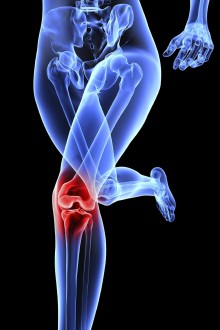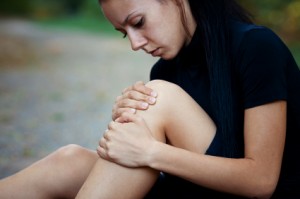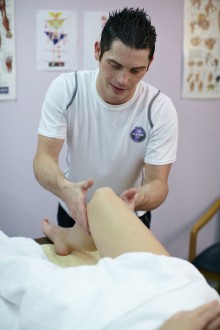 The knee has 3 separate joints within it, two of which are clinically important:
The knee has 3 separate joints within it, two of which are clinically important:
- The tibial-femoral joint which is the main ‘hinge’ joint of the knee
- The patella-femoral joint which is the articulation between the knee-cap and the femur below
Causes of Knee Pain
Tibial-Femoral joint:
- Ligament injuries – ACL (anterior Cruciate Ligament) and MCL (Medial Collateral Ligament) injuries are common in contact sports, skiing and even dancing!
- Arthritis – degenerative change of the knee with increasing age or after trauma is commonplace
- Cartilage injury – the ‘meniscal’ cartilage particularly on the inner (medial) side of the knee after a twisting or contact injury
- Muscle strain – of the muscles which support the knee such as hamstrings, calves and quadriceps.
 Patella-Femoral joint:
Patella-Femoral joint:
- Anterior Knee Pain – caused by malalignment of the knee-cap causing grating of its underside on the thigh bone (femur) below – this causes pain particularly in prolonged sitting and climbing stairs.
- Patella tendonitis – inflammation of the tendon below the knee cap typically seen in runners, jumpers and endurance sports. A form of this problem seen in children is known as Osgood-Schlatter’s disease.
Treatment
 At your first appointment your physiotherapist will take a detailed history of your complaint ascertaining the exact mechanism and aggravating factors of your injury. Detailed examination follows – here at The Village Physios we take a whole body approach to diagnosis:
At your first appointment your physiotherapist will take a detailed history of your complaint ascertaining the exact mechanism and aggravating factors of your injury. Detailed examination follows – here at The Village Physios we take a whole body approach to diagnosis:
- Specific detailed clinical tests to identify the problem
- You may be asked to walk/run on a treadmill (if able) to assess gait and running style.
- Examination of the biomechanics of your feet and lower limbs in standing and motion
- Muscle length testing to highlight imbalances and overactive muscles
A diagnosis will then be discussed with you and a treatment plan outlined – treatment will then start immediately, during that first session.
We can help you
Contact us on 0113 2670576 or tell us about your problem by clicking here.
If we suspect a torn ligament or meniscal cartilage we can refer you directly to experienced and highly reputable knee surgeons.
If the biomechanics of your feet are a causative factor we can refer you directly to our Musculoskeletal Podiatrist (link to Podiatry page at TLC) for the provision of orthotic insoles.